
Question Number 64475 by aliesam last updated on 18/Jul/19
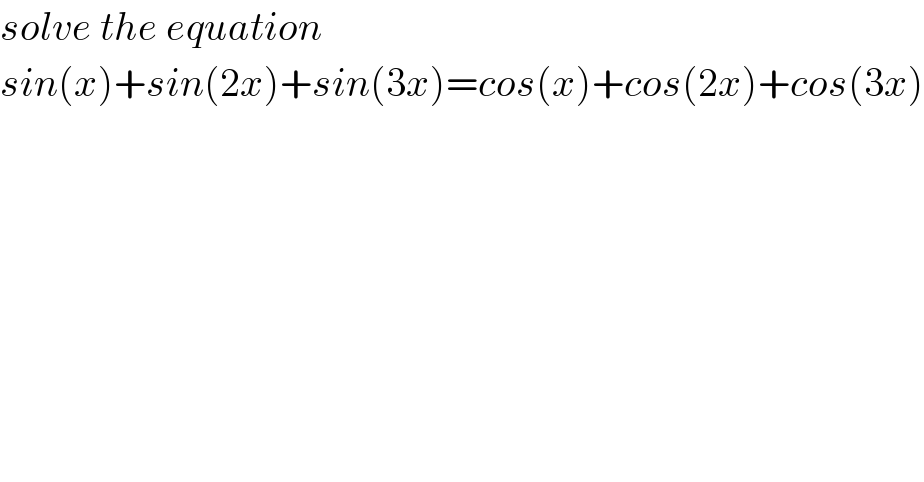
$${solve}\:{the}\:{equation} \\ $$$${sin}\left({x}\right)+{sin}\left(\mathrm{2}{x}\right)+{sin}\left(\mathrm{3}{x}\right)={cos}\left({x}\right)+{cos}\left(\mathrm{2}{x}\right)+{cos}\left(\mathrm{3}{x}\right) \\ $$
Commented by mathmax by abdo last updated on 18/Jul/19
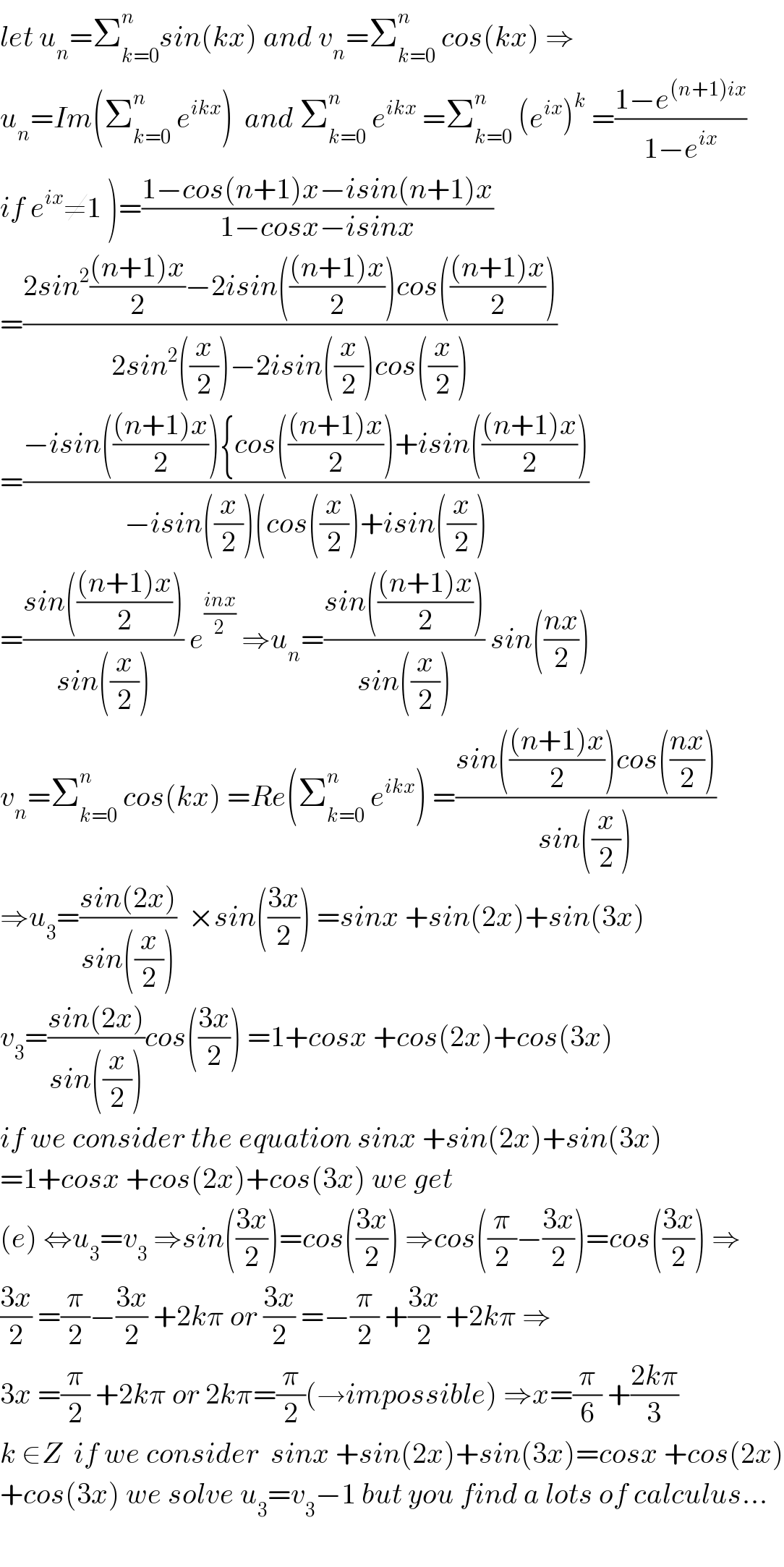
$${let}\:{u}_{{n}} =\sum_{{k}=\mathrm{0}} ^{{n}} {sin}\left({kx}\right)\:{and}\:{v}_{{n}} =\sum_{{k}=\mathrm{0}} ^{{n}} \:{cos}\left({kx}\right)\:\Rightarrow \\ $$$${u}_{{n}} ={Im}\left(\sum_{{k}=\mathrm{0}} ^{{n}} \:{e}^{{ikx}} \right)\:\:{and}\:\sum_{{k}=\mathrm{0}} ^{{n}} \:{e}^{{ikx}} \:=\sum_{{k}=\mathrm{0}} ^{{n}} \:\left({e}^{{ix}} \right)^{{k}} \:=\frac{\mathrm{1}−{e}^{\left({n}+\mathrm{1}\right){ix}} }{\mathrm{1}−{e}^{{ix}} } \\ $$$$\left.{if}\:{e}^{{ix}} \neq\mathrm{1}\:\right)=\frac{\mathrm{1}−{cos}\left({n}+\mathrm{1}\right){x}−{isin}\left({n}+\mathrm{1}\right){x}}{\mathrm{1}−{cosx}−{isinx}} \\ $$$$=\frac{\mathrm{2}{sin}^{\mathrm{2}} \frac{\left({n}+\mathrm{1}\right){x}}{\mathrm{2}}−\mathrm{2}{isin}\left(\frac{\left({n}+\mathrm{1}\right){x}}{\mathrm{2}}\right){cos}\left(\frac{\left({n}+\mathrm{1}\right){x}}{\mathrm{2}}\right)}{\mathrm{2}{sin}^{\mathrm{2}} \left(\frac{{x}}{\mathrm{2}}\right)−\mathrm{2}{isin}\left(\frac{{x}}{\mathrm{2}}\right){cos}\left(\frac{{x}}{\mathrm{2}}\right)} \\ $$$$=\frac{−{isin}\left(\frac{\left({n}+\mathrm{1}\right){x}}{\mathrm{2}}\right)\left\{{cos}\left(\frac{\left({n}+\mathrm{1}\right){x}}{\mathrm{2}}\right)+{isin}\left(\frac{\left({n}+\mathrm{1}\right){x}}{\mathrm{2}}\right)\right.}{−{isin}\left(\frac{{x}}{\mathrm{2}}\right)\left({cos}\left(\frac{{x}}{\mathrm{2}}\right)+{isin}\left(\frac{{x}}{\mathrm{2}}\right)\right.} \\ $$$$=\frac{{sin}\left(\frac{\left({n}+\mathrm{1}\right){x}}{\mathrm{2}}\right)}{{sin}\left(\frac{{x}}{\mathrm{2}}\right)}\:{e}^{\frac{{inx}}{\mathrm{2}}} \:\Rightarrow{u}_{{n}} =\frac{{sin}\left(\frac{\left({n}+\mathrm{1}\right){x}}{\mathrm{2}}\right)}{{sin}\left(\frac{{x}}{\mathrm{2}}\right)}\:{sin}\left(\frac{{nx}}{\mathrm{2}}\right) \\ $$$${v}_{{n}} =\sum_{{k}=\mathrm{0}} ^{{n}} \:{cos}\left({kx}\right)\:={Re}\left(\sum_{{k}=\mathrm{0}} ^{{n}} \:{e}^{{ikx}} \right)\:=\frac{{sin}\left(\frac{\left({n}+\mathrm{1}\right){x}}{\mathrm{2}}\right){cos}\left(\frac{{nx}}{\mathrm{2}}\right)}{{sin}\left(\frac{{x}}{\mathrm{2}}\right)} \\ $$$$\Rightarrow{u}_{\mathrm{3}} =\frac{{sin}\left(\mathrm{2}{x}\right)}{{sin}\left(\frac{{x}}{\mathrm{2}}\right)}\:\:×{sin}\left(\frac{\mathrm{3}{x}}{\mathrm{2}}\right)\:={sinx}\:+{sin}\left(\mathrm{2}{x}\right)+{sin}\left(\mathrm{3}{x}\right) \\ $$$${v}_{\mathrm{3}} =\frac{{sin}\left(\mathrm{2}{x}\right)}{{sin}\left(\frac{{x}}{\mathrm{2}}\right)}{cos}\left(\frac{\mathrm{3}{x}}{\mathrm{2}}\right)\:=\mathrm{1}+{cosx}\:+{cos}\left(\mathrm{2}{x}\right)+{cos}\left(\mathrm{3}{x}\right) \\ $$$${if}\:{we}\:{consider}\:{the}\:{equation}\:{sinx}\:+{sin}\left(\mathrm{2}{x}\right)+{sin}\left(\mathrm{3}{x}\right) \\ $$$$=\mathrm{1}+{cosx}\:+{cos}\left(\mathrm{2}{x}\right)+{cos}\left(\mathrm{3}{x}\right)\:{we}\:{get} \\ $$$$\left({e}\right)\:\Leftrightarrow{u}_{\mathrm{3}} ={v}_{\mathrm{3}} \:\Rightarrow{sin}\left(\frac{\mathrm{3}{x}}{\mathrm{2}}\right)={cos}\left(\frac{\mathrm{3}{x}}{\mathrm{2}}\right)\:\Rightarrow{cos}\left(\frac{\pi}{\mathrm{2}}−\frac{\mathrm{3}{x}}{\mathrm{2}}\right)={cos}\left(\frac{\mathrm{3}{x}}{\mathrm{2}}\right)\:\Rightarrow \\ $$$$\frac{\mathrm{3}{x}}{\mathrm{2}}\:=\frac{\pi}{\mathrm{2}}−\frac{\mathrm{3}{x}}{\mathrm{2}}\:+\mathrm{2}{k}\pi\:{or}\:\frac{\mathrm{3}{x}}{\mathrm{2}}\:=−\frac{\pi}{\mathrm{2}}\:+\frac{\mathrm{3}{x}}{\mathrm{2}}\:+\mathrm{2}{k}\pi\:\Rightarrow \\ $$$$\mathrm{3}{x}\:=\frac{\pi}{\mathrm{2}}\:+\mathrm{2}{k}\pi\:{or}\:\mathrm{2}{k}\pi=\frac{\pi}{\mathrm{2}}\left(\rightarrow{impossible}\right)\:\Rightarrow{x}=\frac{\pi}{\mathrm{6}}\:+\frac{\mathrm{2}{k}\pi}{\mathrm{3}} \\ $$$${k}\:\in{Z}\:\:{if}\:{we}\:{consider}\:\:{sinx}\:+{sin}\left(\mathrm{2}{x}\right)+{sin}\left(\mathrm{3}{x}\right)={cosx}\:+{cos}\left(\mathrm{2}{x}\right) \\ $$$$+{cos}\left(\mathrm{3}{x}\right)\:{we}\:{solve}\:{u}_{\mathrm{3}} ={v}_{\mathrm{3}} −\mathrm{1}\:{but}\:{you}\:{find}\:{a}\:{lots}\:{of}\:{calculus}... \\ $$$$ \\ $$
Commented by aliesam last updated on 18/Jul/19

$${god}\:{bless}\:{you}\:{sir} \\ $$
Commented by mathmax by abdo last updated on 18/Jul/19
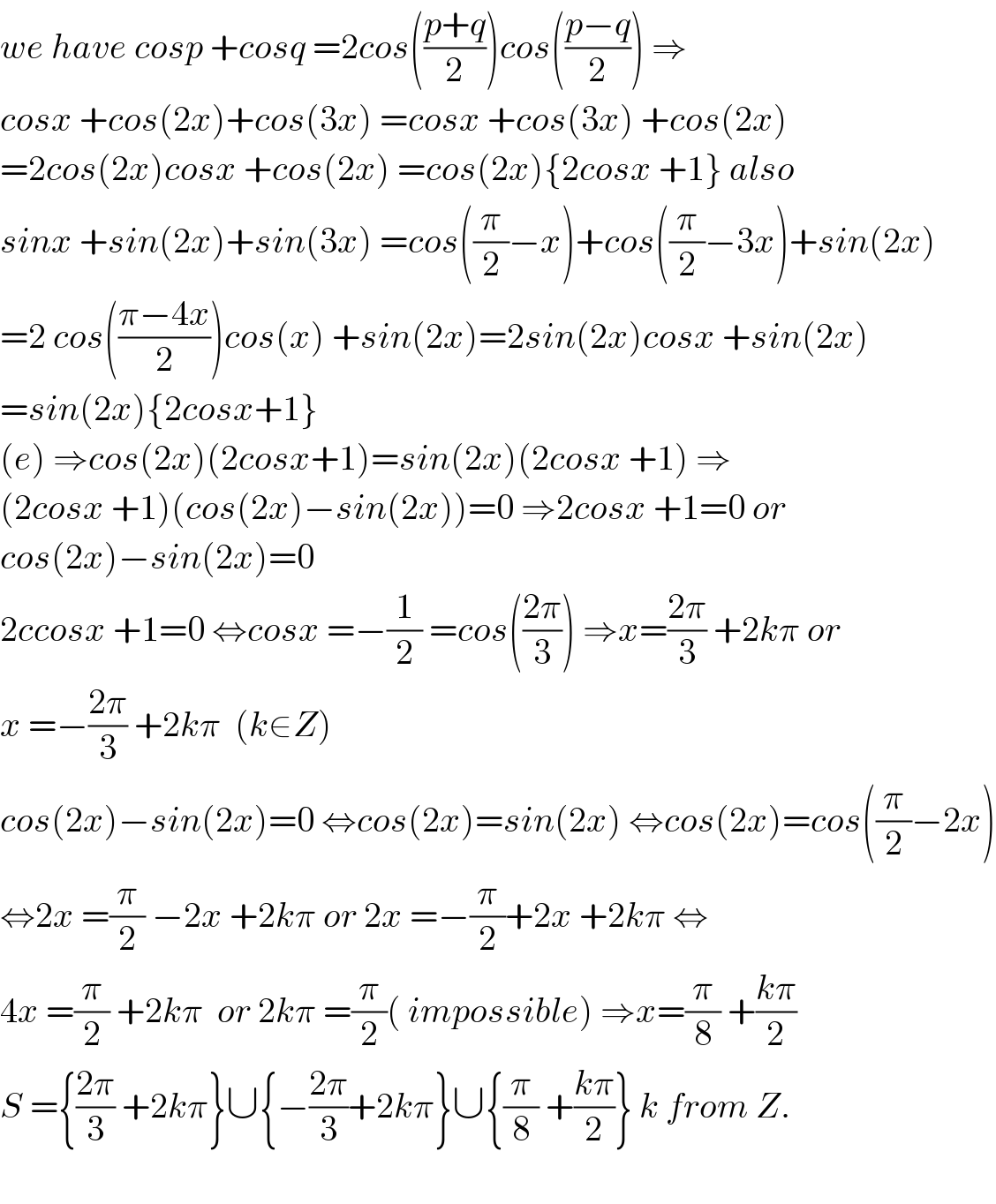
$${we}\:{have}\:{cosp}\:+{cosq}\:=\mathrm{2}{cos}\left(\frac{{p}+{q}}{\mathrm{2}}\right){cos}\left(\frac{{p}−{q}}{\mathrm{2}}\right)\:\Rightarrow \\ $$$${cosx}\:+{cos}\left(\mathrm{2}{x}\right)+{cos}\left(\mathrm{3}{x}\right)\:={cosx}\:+{cos}\left(\mathrm{3}{x}\right)\:+{cos}\left(\mathrm{2}{x}\right) \\ $$$$=\mathrm{2}{cos}\left(\mathrm{2}{x}\right){cosx}\:+{cos}\left(\mathrm{2}{x}\right)\:={cos}\left(\mathrm{2}{x}\right)\left\{\mathrm{2}{cosx}\:+\mathrm{1}\right\}\:{also} \\ $$$${sinx}\:+{sin}\left(\mathrm{2}{x}\right)+{sin}\left(\mathrm{3}{x}\right)\:={cos}\left(\frac{\pi}{\mathrm{2}}−{x}\right)+{cos}\left(\frac{\pi}{\mathrm{2}}−\mathrm{3}{x}\right)+{sin}\left(\mathrm{2}{x}\right) \\ $$$$=\mathrm{2}\:{cos}\left(\frac{\pi−\mathrm{4}{x}}{\mathrm{2}}\right){cos}\left({x}\right)\:+{sin}\left(\mathrm{2}{x}\right)=\mathrm{2}{sin}\left(\mathrm{2}{x}\right){cosx}\:+{sin}\left(\mathrm{2}{x}\right) \\ $$$$={sin}\left(\mathrm{2}{x}\right)\left\{\mathrm{2}{cosx}+\mathrm{1}\right\} \\ $$$$\left({e}\right)\:\Rightarrow{cos}\left(\mathrm{2}{x}\right)\left(\mathrm{2}{cosx}+\mathrm{1}\right)={sin}\left(\mathrm{2}{x}\right)\left(\mathrm{2}{cosx}\:+\mathrm{1}\right)\:\Rightarrow \\ $$$$\left(\mathrm{2}{cosx}\:+\mathrm{1}\right)\left({cos}\left(\mathrm{2}{x}\right)−{sin}\left(\mathrm{2}{x}\right)\right)=\mathrm{0}\:\Rightarrow\mathrm{2}{cosx}\:+\mathrm{1}=\mathrm{0}\:{or} \\ $$$${cos}\left(\mathrm{2}{x}\right)−{sin}\left(\mathrm{2}{x}\right)=\mathrm{0}\: \\ $$$$\mathrm{2}{ccosx}\:+\mathrm{1}=\mathrm{0}\:\Leftrightarrow{cosx}\:=−\frac{\mathrm{1}}{\mathrm{2}}\:={cos}\left(\frac{\mathrm{2}\pi}{\mathrm{3}}\right)\:\Rightarrow{x}=\frac{\mathrm{2}\pi}{\mathrm{3}}\:+\mathrm{2}{k}\pi\:{or} \\ $$$${x}\:=−\frac{\mathrm{2}\pi}{\mathrm{3}}\:+\mathrm{2}{k}\pi\:\:\left({k}\in{Z}\right) \\ $$$${cos}\left(\mathrm{2}{x}\right)−{sin}\left(\mathrm{2}{x}\right)=\mathrm{0}\:\Leftrightarrow{cos}\left(\mathrm{2}{x}\right)={sin}\left(\mathrm{2}{x}\right)\:\Leftrightarrow{cos}\left(\mathrm{2}{x}\right)={cos}\left(\frac{\pi}{\mathrm{2}}−\mathrm{2}{x}\right) \\ $$$$\Leftrightarrow\mathrm{2}{x}\:=\frac{\pi}{\mathrm{2}}\:−\mathrm{2}{x}\:+\mathrm{2}{k}\pi\:{or}\:\mathrm{2}{x}\:=−\frac{\pi}{\mathrm{2}}+\mathrm{2}{x}\:+\mathrm{2}{k}\pi\:\Leftrightarrow \\ $$$$\mathrm{4}{x}\:=\frac{\pi}{\mathrm{2}}\:+\mathrm{2}{k}\pi\:\:{or}\:\mathrm{2}{k}\pi\:=\frac{\pi}{\mathrm{2}}\left(\:{impossible}\right)\:\Rightarrow{x}=\frac{\pi}{\mathrm{8}}\:+\frac{{k}\pi}{\mathrm{2}} \\ $$$${S}\:=\left\{\frac{\mathrm{2}\pi}{\mathrm{3}}\:+\mathrm{2}{k}\pi\right\}\cup\left\{−\frac{\mathrm{2}\pi}{\mathrm{3}}+\mathrm{2}{k}\pi\right\}\cup\left\{\frac{\pi}{\mathrm{8}}\:+\frac{{k}\pi}{\mathrm{2}}\right\}\:{k}\:{from}\:{Z}. \\ $$$$ \\ $$
Commented by mathmax by abdo last updated on 18/Jul/19

$${you}\:{are}\:{welcome}\:{sir}\:{your}\:{equation}\:{is}\:{solved}\:{next}... \\ $$
Commented by aliesam last updated on 18/Jul/19

$${great}\:{work}\:{sir}\: \\ $$$$ \\ $$
Commented by aliesam last updated on 18/Jul/19
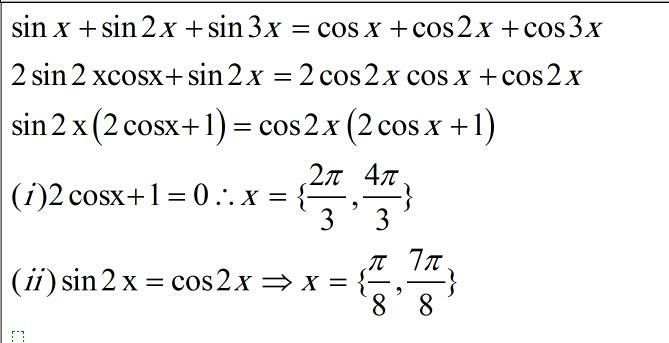
Answered by Chi Mes Try last updated on 18/Jul/19
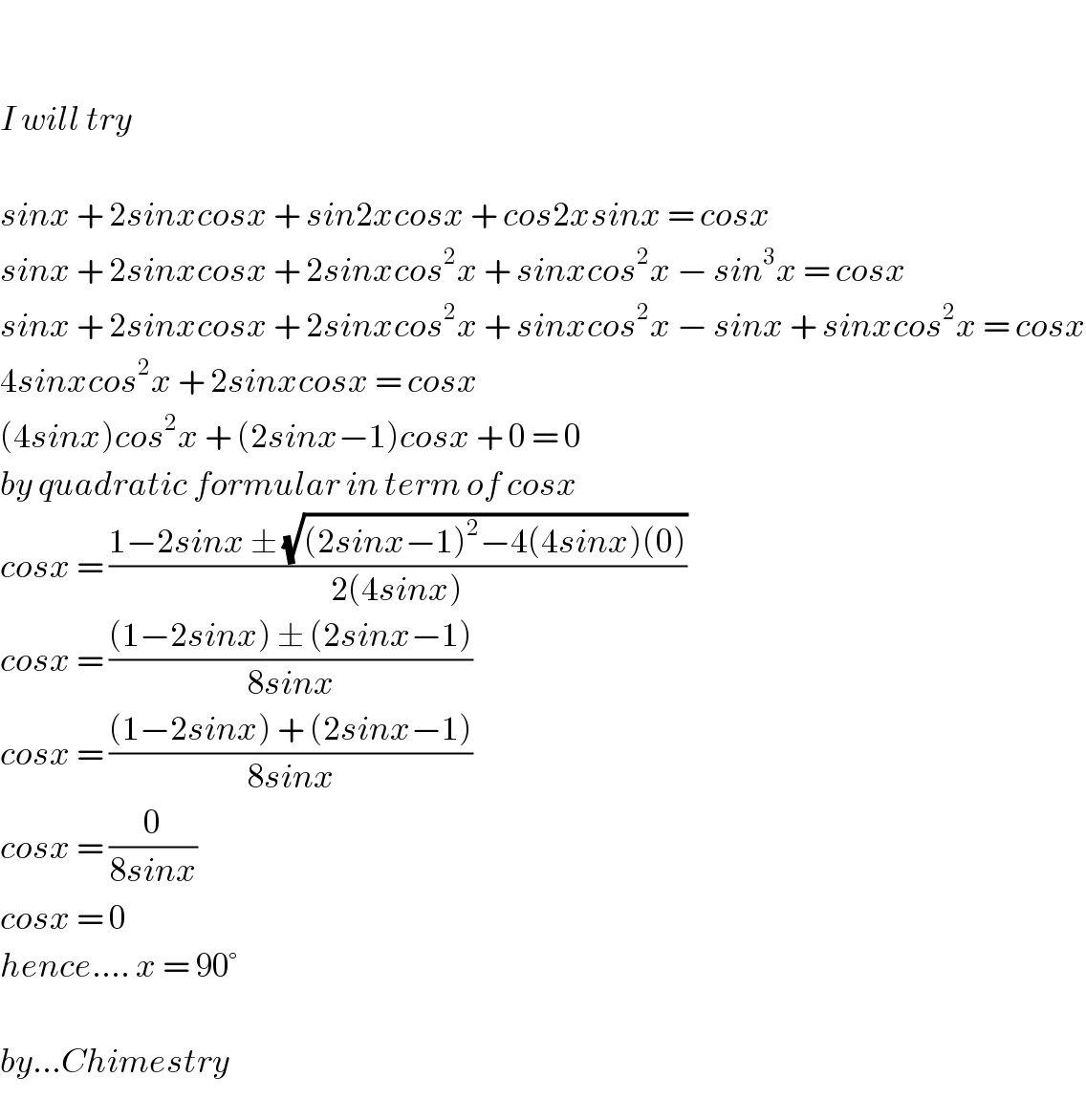
$$ \\ $$$$ \\ $$$${I}\:{will}\:{try} \\ $$$$ \\ $$$${sinx}\:+\:\mathrm{2}{sinxcosx}\:+\:{sin}\mathrm{2}{xcosx}\:+\:{cos}\mathrm{2}{xsinx}\:=\:{cosx} \\ $$$${sinx}\:+\:\mathrm{2}{sinxcosx}\:+\:\mathrm{2}{sinxcos}^{\mathrm{2}} {x}\:+\:{sinxcos}^{\mathrm{2}} {x}\:−\:{sin}^{\mathrm{3}} {x}\:=\:{cosx} \\ $$$${sinx}\:+\:\mathrm{2}{sinxcosx}\:+\:\mathrm{2}{sinxcos}^{\mathrm{2}} {x}\:+\:{sinxcos}^{\mathrm{2}} {x}\:−\:{sinx}\:+\:{sinxcos}^{\mathrm{2}} {x}\:=\:{cosx} \\ $$$$\mathrm{4}{sinxcos}^{\mathrm{2}} {x}\:+\:\mathrm{2}{sinxcosx}\:=\:{cosx} \\ $$$$\left(\mathrm{4}{sinx}\right){cos}^{\mathrm{2}} {x}\:+\:\left(\mathrm{2}{sinx}−\mathrm{1}\right){cosx}\:+\:\mathrm{0}\:=\:\mathrm{0} \\ $$$${by}\:{quadratic}\:{formular}\:{in}\:{term}\:{of}\:{cosx} \\ $$$${cosx}\:=\:\frac{\mathrm{1}−\mathrm{2}{sinx}\:\pm\:\sqrt{\left(\mathrm{2}{sinx}−\mathrm{1}\right)^{\mathrm{2}} −\mathrm{4}\left(\mathrm{4}{sinx}\right)\left(\mathrm{0}\right)}}{\mathrm{2}\left(\mathrm{4}{sinx}\right)} \\ $$$${cosx}\:=\:\frac{\left(\mathrm{1}−\mathrm{2}{sinx}\right)\:\pm\:\left(\mathrm{2}{sinx}−\mathrm{1}\right)}{\mathrm{8}{sinx}} \\ $$$${cosx}\:=\:\frac{\left(\mathrm{1}−\mathrm{2}{sinx}\right)\:+\:\left(\mathrm{2}{sinx}−\mathrm{1}\right)}{\mathrm{8}{sinx}} \\ $$$${cosx}\:=\:\frac{\mathrm{0}}{\mathrm{8}{sinx}} \\ $$$${cosx}\:=\:\mathrm{0} \\ $$$${hence}....\:{x}\:=\:\mathrm{90}° \\ $$$$ \\ $$$${by}...{Chimestry} \\ $$
Commented by aliesam last updated on 18/Jul/19

$${thank}\:{you}\:{sir} \\ $$
Commented by mr W last updated on 18/Jul/19

$$\mathrm{sin}\:\mathrm{90}°+\mathrm{sin}\:\mathrm{180}°+\mathrm{sin}\:\mathrm{270}°=\mathrm{1}+\mathrm{0}−\mathrm{1}=\mathrm{0} \\ $$$$\mathrm{cos}\:\mathrm{90}°+\mathrm{cos}\:\mathrm{180}°+\mathrm{cos}\:\mathrm{270}°=\mathrm{0}−\mathrm{1}+\mathrm{0}=−\mathrm{1} \\ $$$$\Rightarrow{x}=\mathrm{90}°\:{is}\:{no}\:{solution}. \\ $$
Answered by MJS last updated on 18/Jul/19
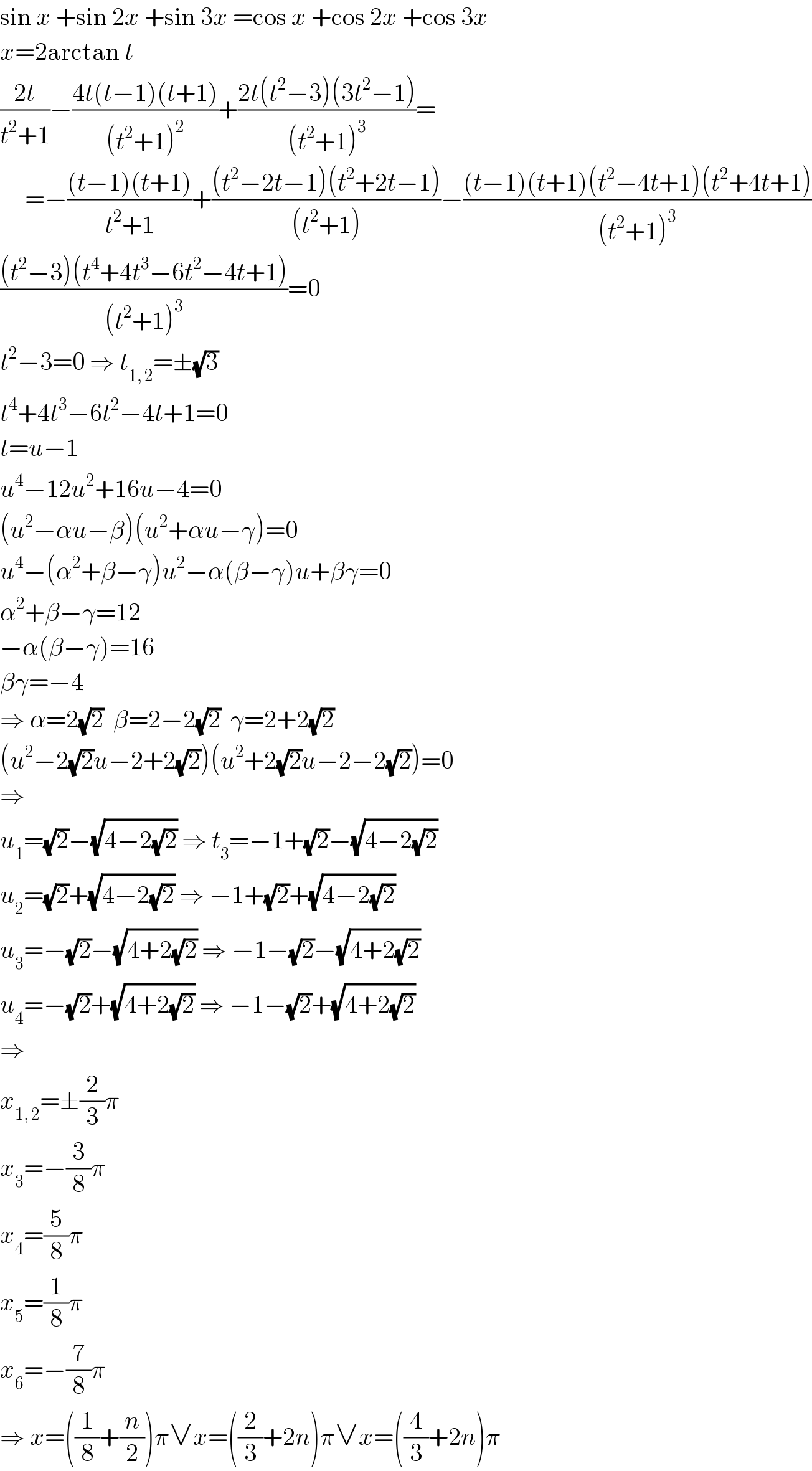
$$\mathrm{sin}\:{x}\:+\mathrm{sin}\:\mathrm{2}{x}\:+\mathrm{sin}\:\mathrm{3}{x}\:=\mathrm{cos}\:{x}\:+\mathrm{cos}\:\mathrm{2}{x}\:+\mathrm{cos}\:\mathrm{3}{x} \\ $$$${x}=\mathrm{2arctan}\:{t} \\ $$$$\frac{\mathrm{2}{t}}{{t}^{\mathrm{2}} +\mathrm{1}}−\frac{\mathrm{4}{t}\left({t}−\mathrm{1}\right)\left({t}+\mathrm{1}\right)}{\left({t}^{\mathrm{2}} +\mathrm{1}\right)^{\mathrm{2}} }+\frac{\mathrm{2}{t}\left({t}^{\mathrm{2}} −\mathrm{3}\right)\left(\mathrm{3}{t}^{\mathrm{2}} −\mathrm{1}\right)}{\left({t}^{\mathrm{2}} +\mathrm{1}\right)^{\mathrm{3}} }= \\ $$$$\:\:\:\:\:=−\frac{\left({t}−\mathrm{1}\right)\left({t}+\mathrm{1}\right)}{{t}^{\mathrm{2}} +\mathrm{1}}+\frac{\left({t}^{\mathrm{2}} −\mathrm{2}{t}−\mathrm{1}\right)\left({t}^{\mathrm{2}} +\mathrm{2}{t}−\mathrm{1}\right)}{\left({t}^{\mathrm{2}} +\mathrm{1}\right)}−\frac{\left({t}−\mathrm{1}\right)\left({t}+\mathrm{1}\right)\left({t}^{\mathrm{2}} −\mathrm{4}{t}+\mathrm{1}\right)\left({t}^{\mathrm{2}} +\mathrm{4}{t}+\mathrm{1}\right)}{\left({t}^{\mathrm{2}} +\mathrm{1}\right)^{\mathrm{3}} } \\ $$$$\frac{\left({t}^{\mathrm{2}} −\mathrm{3}\right)\left({t}^{\mathrm{4}} +\mathrm{4}{t}^{\mathrm{3}} −\mathrm{6}{t}^{\mathrm{2}} −\mathrm{4}{t}+\mathrm{1}\right)}{\left({t}^{\mathrm{2}} +\mathrm{1}\right)^{\mathrm{3}} }=\mathrm{0} \\ $$$${t}^{\mathrm{2}} −\mathrm{3}=\mathrm{0}\:\Rightarrow\:{t}_{\mathrm{1},\:\mathrm{2}} =\pm\sqrt{\mathrm{3}} \\ $$$${t}^{\mathrm{4}} +\mathrm{4}{t}^{\mathrm{3}} −\mathrm{6}{t}^{\mathrm{2}} −\mathrm{4}{t}+\mathrm{1}=\mathrm{0} \\ $$$${t}={u}−\mathrm{1} \\ $$$${u}^{\mathrm{4}} −\mathrm{12}{u}^{\mathrm{2}} +\mathrm{16}{u}−\mathrm{4}=\mathrm{0} \\ $$$$\left({u}^{\mathrm{2}} −\alpha{u}−\beta\right)\left({u}^{\mathrm{2}} +\alpha{u}−\gamma\right)=\mathrm{0} \\ $$$${u}^{\mathrm{4}} −\left(\alpha^{\mathrm{2}} +\beta−\gamma\right){u}^{\mathrm{2}} −\alpha\left(\beta−\gamma\right){u}+\beta\gamma=\mathrm{0} \\ $$$$\alpha^{\mathrm{2}} +\beta−\gamma=\mathrm{12} \\ $$$$−\alpha\left(\beta−\gamma\right)=\mathrm{16} \\ $$$$\beta\gamma=−\mathrm{4} \\ $$$$\Rightarrow\:\alpha=\mathrm{2}\sqrt{\mathrm{2}}\:\:\beta=\mathrm{2}−\mathrm{2}\sqrt{\mathrm{2}}\:\:\gamma=\mathrm{2}+\mathrm{2}\sqrt{\mathrm{2}} \\ $$$$\left({u}^{\mathrm{2}} −\mathrm{2}\sqrt{\mathrm{2}}{u}−\mathrm{2}+\mathrm{2}\sqrt{\mathrm{2}}\right)\left({u}^{\mathrm{2}} +\mathrm{2}\sqrt{\mathrm{2}}{u}−\mathrm{2}−\mathrm{2}\sqrt{\mathrm{2}}\right)=\mathrm{0} \\ $$$$\Rightarrow \\ $$$${u}_{\mathrm{1}} =\sqrt{\mathrm{2}}−\sqrt{\mathrm{4}−\mathrm{2}\sqrt{\mathrm{2}}}\:\Rightarrow\:{t}_{\mathrm{3}} =−\mathrm{1}+\sqrt{\mathrm{2}}−\sqrt{\mathrm{4}−\mathrm{2}\sqrt{\mathrm{2}}} \\ $$$${u}_{\mathrm{2}} =\sqrt{\mathrm{2}}+\sqrt{\mathrm{4}−\mathrm{2}\sqrt{\mathrm{2}}}\:\Rightarrow\:−\mathrm{1}+\sqrt{\mathrm{2}}+\sqrt{\mathrm{4}−\mathrm{2}\sqrt{\mathrm{2}}} \\ $$$${u}_{\mathrm{3}} =−\sqrt{\mathrm{2}}−\sqrt{\mathrm{4}+\mathrm{2}\sqrt{\mathrm{2}}}\:\Rightarrow\:−\mathrm{1}−\sqrt{\mathrm{2}}−\sqrt{\mathrm{4}+\mathrm{2}\sqrt{\mathrm{2}}} \\ $$$${u}_{\mathrm{4}} =−\sqrt{\mathrm{2}}+\sqrt{\mathrm{4}+\mathrm{2}\sqrt{\mathrm{2}}}\:\Rightarrow\:−\mathrm{1}−\sqrt{\mathrm{2}}+\sqrt{\mathrm{4}+\mathrm{2}\sqrt{\mathrm{2}}} \\ $$$$\Rightarrow \\ $$$${x}_{\mathrm{1},\:\mathrm{2}} =\pm\frac{\mathrm{2}}{\mathrm{3}}\pi \\ $$$${x}_{\mathrm{3}} =−\frac{\mathrm{3}}{\mathrm{8}}\pi \\ $$$${x}_{\mathrm{4}} =\frac{\mathrm{5}}{\mathrm{8}}\pi \\ $$$${x}_{\mathrm{5}} =\frac{\mathrm{1}}{\mathrm{8}}\pi \\ $$$${x}_{\mathrm{6}} =−\frac{\mathrm{7}}{\mathrm{8}}\pi \\ $$$$\Rightarrow\:{x}=\left(\frac{\mathrm{1}}{\mathrm{8}}+\frac{{n}}{\mathrm{2}}\right)\pi\vee{x}=\left(\frac{\mathrm{2}}{\mathrm{3}}+\mathrm{2}{n}\right)\pi\vee{x}=\left(\frac{\mathrm{4}}{\mathrm{3}}+\mathrm{2}{n}\right)\pi \\ $$
